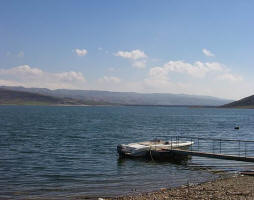 Syria: Water left out as Syrian PPP law founders
Syria: Water left out as Syrian PPP law founders
Opening up opportunities in the Syrian infrastructure sector has been a tortuous process. Are water and wastewater projects getting left behind as the stuttering privatisation process hits another roadblock?
Syria has ambitious plans for its water and wastewater sector, with about 240 treatment plants set to be built in the next 10-15 years. However, the development of the private finance legislation it hoped to use to deliver the plans has not been able to keep up with the growing demand for water.
The Syrian government has been working with the World Bank to develop PPP legislation, and hoped to bring in a new law this month to provide a framework for procuring projects under a BOT (buildoperate- transfer) structure. But the development of the law has now been delayed, leaving many projects that had already started looking for developers stuck in limbo. The introduction of the new PPP law is now not expected until some time next year, although the government has set up a PPP Central Unit as part of the Ministry of Finance in anticipation of procuring more projects through privately supported routes. In the water sector, the delay has hit the two flagship BOT wastewater treatment plants being tendered at Jaramana and Swuedah, both of which are now on hold. Paul Noumba, the Washington, DCbased infrastructure economist who led the World Bank advisory team in Syria, said the slow progress on legislative detail – and the reluctance of the government to give up operational control – means the water sector is not likely to be at the forefront even when change comes on private sector involvement. “I think there are quite a lot of issues with this legislation,” he told GWI. “Syria is coming from a planned economy, so the government didn’t have the legal framework to bring in privatisation. The challenge is really to manage the social support for private management in areas where the government is used to keeping control. They are mainly interested in getting private finance for projects, not the private sector management. I’m not worried about this because the private financing will come as long as you can offer opportunities that are bankable. Noumba pointed out, however, that water was not really a centrepiece for the initial stage of the roll-out. “There might be some smaller prospects in sanitation, water treatment and irrigation, but it was focused on key gateway projects like Damascus airport, and the ringroad there,” he told GWI. The two wastewater BOTs in Swuedah and Jaramana were intended to be trailblazers for other projects. They were to be developed by Syrian-Qatari Holdings (SQH), a company set up with a grant from the two countries’ governments. SQH, however, failed to reach a financial agreement with the Syrian Ministry of Housing and Construction for the two plants, which were set to serve more than 500,000 people in the region south of Damascus. SQH blamed this on the slow progress of the PPP law, as well as the difficulty expected in recovering operating costs through tariffs. Elsewhere in the country, water and wastewater projects continued to be funded directly by the government, often with support from international development finance agencies. Syria has been looking at ways to increase privatisation since opening up its economy to the world for the first time in 2002.Since the decision was made to move towards a more market-based economy, German consultancy GTZ has worked with the Syrian government on a number of projects to reform operations. The Modernisation Programme for the Syrian Water Sector was launched in 2006 and has seen GTZ work with the Ministry of Housing and Construction to develop the water sector, which has involved overseeing the first steps towards privatisation. A source at the Modernisation Programme said the government had been willing to deal with the local private sector, but that local companies suffer from a lack of skills and experience in delivering and operating projects of the kind required in Syria. He added that the programme hopes to encourage more operations and management- based contracts for the private sector in Syria, to bring in skilled workers from outside the country, and to act as a precursor to further expansion of the role of the private sector in the country’s water and wastewater network. “At the moment, they aren’t ready for this sharing, this participation from the private sector,” the source told GWI. “It will take a change of mindset. They aren’t keen on leaving operators to run facilities, they prefer to specify everything they want the private sector to do – there’s no culture of delegation.”
| Contact information | n/a |
|---|---|
| News type | Inbrief |
| File link |
http://www.globalwaterintel.com/archive/11/12/general/water-left-out-syrian-ppp-law-founders.html |
| Source of information | Global Water Intelligence |
| Subject(s) | FINANCE-ECONOMY , POLICY-WATER POLICY AND WATER MANAGEMENT |
| Relation | http://www.semide.org/countries/fol749974/sy |
| Geographical coverage | Syria, |
| News date | 25/12/2010 |
| Working language(s) | ENGLISH |
 you are not logged in
you are not logged in





